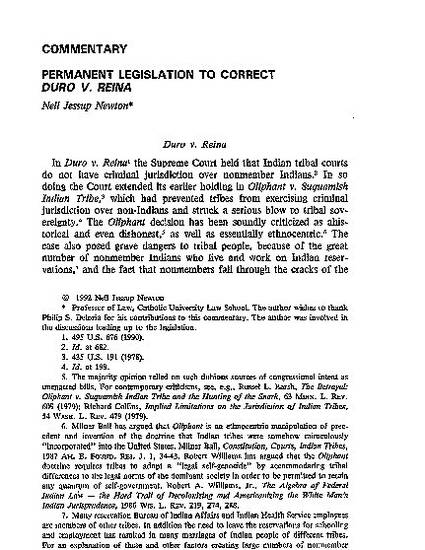
In Duro v. Reinal the Supreme Court held that Indian tribal courts do not have criminal jurisdiction over nonmember Indians. In so doing the Court extended its earlier holding in Oliphant v. Suquamish Indian Tribe, which had prevented tribes from exercising criminal jurisdiction over non-Indians and struck a serious blow to tribal sovereignty. The Oliphant decision has been soundly criticized as ahistorical and even dishonest, as well as essentially ethnocentric. The case also posed grave dangers to tribal people, because of the great number of nonmember Indians who live and work on Indian reservations, and the fact that nonmembers fall through the cracks of the federal criminal jurisdiction scheme that applies to Indians committing crimes on reservations. Consequently, tribes were helpless to take anything but the most limited action against nonmembers committing misdemeanors on reservations.
In the fall of 1990 Congress enacted temporary legislation to address the problems created by Duro, by means of a rider to an appropriations act, amending the definition sections of the Indian Civil Rights Act (ICRA). In response to some of the above concerns about tribal court procedures, a sunset provision was added during the conference on the bill, providing for a cutoff date of September 30, 1991. Two weeks after the temporary Duro-correction expired, the Senate enacted the permanent solution, and the President signed it into law on October 28, 1991.
But the Indian law community has not heard the last of this issue, for the law is surely to be challenged and reviewed by the federal courts. In particular, opponents can be expected to argue that the law is only effective as delegated federal power, bringing with it the full panoply of Bill of Rights protections. Moreover, the issue whether federal court review of tribal court judgments is necessary is before the Senate and can be expected to arise repeatedly. In the remainder of this article, I will address four issues that can be expected to dominate the discussion of the constitutionality and wisdom of the law. The rest of this article analyzes these issues: (1) the interpretive issue: whether the law effectively corrected the Court's misinterpretation of congressional intent; (2) whether the Bill of Rights must be applied to tribal courts; (3) whether distinguishing between member and nonmember Indians violates the equal protection principle; (4) whether it is fair for tribes to exercise jurisdiction over nonmembers who cannot vote in tribal elections.
Available at: http://works.bepress.com/nell_jessup_newton/32/
